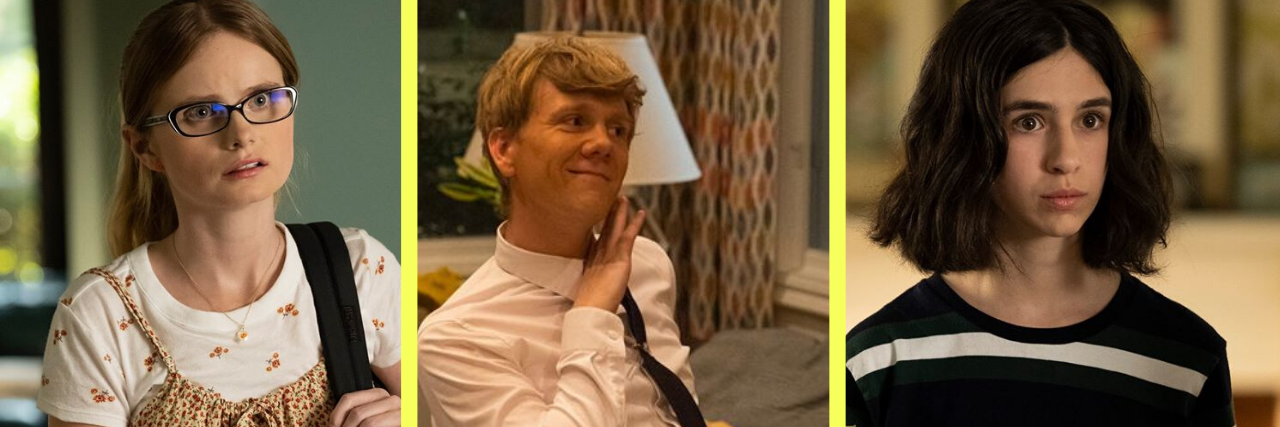Why It Was Difficult to Watch 'Everything's Gonna Be Okay' as an Autistic Woman
Editor's Note
Warning: Contains spoilers for the first three episodes of “Everything’s Gonna Be Okay.”
Freeform’s “Everything’s Gonna Be Okay” follows 25-year-old Nicholas (Josh Thomas) and his teenage half-sisters, Matilda and Genevieve after he suddenly finds himself the guardian of his two sisters following their father passing away from cancer. He has to learn how to take care of his family, especially Matilda, who is on the autism spectrum. I watched the first three episodes, which are available on Hulu, and noticed all the episodes are named after bugs that appear in the show — which I think might delight many of us on the spectrum.
Let me start off by saying this is a fantastic show. It’s funny, witty and has some amazing queer representation. The fact that I finally get to see a character like me, played by someone like me, is just the icing on the cake. I can safely say I personally have never seen an autistic female portrayed on TV or in the movies. Luckily for me, Matilda (Kayla Cromer) provides a wonderful representation. Her character, along with all the others on the show, is so well-written. I also, love, love, love the fact that the actress herself is autistic.
The first episode introduces us to all the characters, including the dad. We find out about the cancer and, after the dad dies, there’s a funeral. As a child of a parent who had cancer when I was in middle school, this hit me hard. My favorite moment from that episode is when Matilda gives the eulogy. She expressed thoughts I now have the language for, like how her dad believed in her more than her doctors, and how he helped her navigate an often scary and confusing world.
I had to rely on my dad to interpret the world, to teach me how to do every little thing, so I carry him with me every day. Every time I tie my shoelaces or cross the road without dying, or make eye contact with anybody, or demonstrate a reasonable amount a self-esteem, that is thanks to him going above and beyond.
One thing I really relate to is the family’s sense of humor. Although Matilda does get sentimental during the eulogy, she cracks jokes too — saying her dad probably regretted helping her talk, and acknowledging she was really making the eulogy all about herself.
I have always been a big fan of people making fun of themselves — and a lot of my humor can be self-deprecating. I make jokes all the time about my autism. Matilda is able to laugh at herself, which is very refreshing. She is also able to verbalize when she has no idea what is going on but in a very dry, witty way. I feel like one stereotype of autism is that we don’t understand jokes or that we have no sense of humor. I’m glad to see this show shatter that a bit.
The second episode focused on everybody trying to return to their normal lives. I was very lucky that my mom survived her cancer. I can’t imagine the strength it would take to return to school after that. My favorite moment from that episode is seeing Matilda’s classroom, which looks like “the resource room” I went to in school. Her teacher thinks it’s a perfect time for everyone to work on their condolence social skills and Matilda just says no, insisting she doesn’t want her classmates to console her.
I can also tell the show is going to touch on topics people usually don’t associate with autism. In the third episode, for example, Matilda gets drunk. She is preparing to go to college and decides she wants to get drunk for the first time in a safe environment with her brother and his boyfriend. Getting to see her do normal teenage things made me smile. She also is very open about wanting to be sexual, which is typically not represented at all for people with autism and other disabilities. The world at large often looks at us as children who have no business or interest in having sex. Matilda is a good example of how people with autism want the same things as everybody else.
I also love how the show portrays Matilda’s strengths and weaknesses. I noticed she is not labeled “high-functioning” or otherwise, which makes me happy. She shows how autistic people can be very skilled in one area, but not another. She has an amazing musical talent, but has limited social skills, for example. This is something I personally struggle with and I was glad to see it represented.
I’m not going to lie, this a difficult show to watch, but for very good reasons. I see so much of myself in Matilda. I have not made it through an episode yet that hasn’t brought me back to a difficult time in high school. I’ve cried so much watching this, but I have found myself laughing through my tears. This show does have some trigger warnings, especially death from cancer, but if you can, please watch it. It feels so good to finally be represented in the world of entertainment. I think this show will touch people, whether or not you are connected to autism.
Rating:
You can watch “Everything’s Gonna Be Okay” on Freeform, or stream episodes after they air on Hulu.

